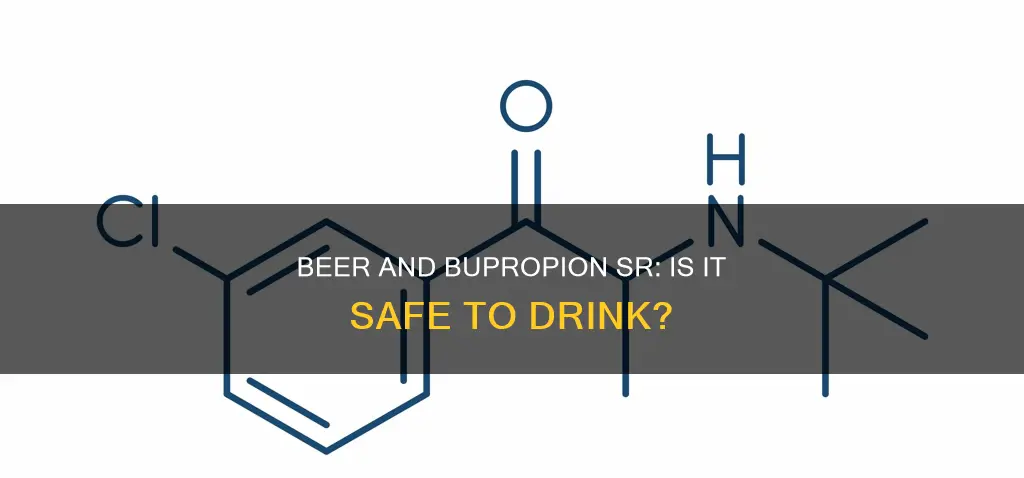
Drinking alcohol while taking Wellbutrin (bupropion) is not recommended, as it can increase the risk of serious side effects, including seizures. Wellbutrin is an antidepressant medication used to treat major depressive disorder and seasonal affective disorder, and it works differently from other common antidepressants. While it is not advisable to consume alcohol while taking Wellbutrin, occasional drinking in small amounts may not cause problems for some individuals. However, it is crucial to consult a healthcare provider to understand the risks and make an informed decision.
| Characteristics | Values |
|---|---|
| Should you drink beer on bupropion SR? | No |
| Why? | It can lead to numerous adverse side effects, which can be life-threatening |
| Side effects | Increased risk of seizures, drowsiness, impaired concentration, nausea and/or vomiting, CNS depression, overdose, and intoxication |
| Bupropion SR and alcohol | Both substances can depress the central nervous system (CNS) |
| Bupropion SR and alcohol withdrawal | Can lead to seizures and other symptoms |
| Bupropion SR and alcohol tolerance | Bupropion SR can lower your alcohol tolerance |
What You'll Learn

Bupropion and alcohol: a dangerous mix
Bupropion, sold under the brand name Wellbutrin®, is an FDA-approved antidepressant medication. It is used to treat symptoms of major depressive disorder and reduce depressive symptoms in people with seasonal affective disorder. It is also prescribed to help people stop smoking.
While bupropion can be an effective treatment for depression, it is important to be aware of potential interactions with other substances, such as alcohol. Mixing bupropion and alcohol can have dangerous consequences and lead to adverse side effects, which may be life-threatening.
Increased Risk of Seizures
One of the most serious risks associated with combining bupropion and alcohol is the increased likelihood of seizures. Both substances can lower the seizure threshold, and when taken together, this risk is further elevated. This is especially true for those with an underlying seizure disorder or other risk factors, such as high doses of bupropion, an eating disorder, or the use of certain other medications.
Intensified Side Effects
Bupropion, like all medications, has potential side effects, including headache, migraine, increased heart rate, and auditory disturbances. Alcohol can intensify these side effects, leading to more severe consequences. Additionally, as bupropion and alcohol have similar side effects, including nausea, vomiting, confusion, and blurred vision, mixing the two can increase the risk of injury or accident.
Impaired Concentration and Drowsiness
Both bupropion and alcohol can cause impaired concentration, drowsiness, and dizziness. When combined, these effects are enhanced, impacting an individual's ability to drive, operate machinery, or engage in physical activities safely. It can also impair one's performance at work or school.
Overdose and Intoxication
The liver may struggle to process both bupropion and alcohol simultaneously, leading to a slower processing time. This can result in increased side effects and an elevated risk of overdose and intoxication.
Interference with Depression Treatment
Alcohol can interfere with the effectiveness of bupropion in treating depression. It may reduce the beneficial effects of the medication, causing a return of depressive symptoms or even worsening of symptoms. Additionally, alcohol itself can worsen depression, as it is a central nervous system depressant.
Alcohol Withdrawal and Bupropion
For individuals who are regular heavy drinkers, abruptly stopping alcohol consumption while taking bupropion can be dangerous. Alcohol withdrawal syndrome is a potentially life-threatening condition and can increase the risk of seizures and other serious side effects, such as severe shaking, tremors, confusion, and hallucinations.
Lowered Alcohol Tolerance
It is important to note that bupropion can lower alcohol tolerance, meaning individuals may experience the effects of alcohol more quickly or intensely than usual.
In conclusion, mixing bupropion and alcohol is not recommended due to the potential for dangerous side effects and interactions. It is crucial to consult with a healthcare provider before consuming alcohol while taking bupropion to ensure a safe and effective treatment plan.
Old Beer: Is It Safe to Drink After 30 Years?
You may want to see also

Wellbutrin and alcohol side effects
Wellbutrin and alcohol: a risky combination
Wellbutrin, also known by its generic name, bupropion, is a commonly prescribed antidepressant. It is also used to help people quit smoking. While Wellbutrin may be well-tolerated by most people, mixing it with alcohol is not recommended and can lead to serious side effects. Here's what you need to do know about the risks and side effects of combining Wellbutrin and alcohol.
Neurological and psychiatric side effects
Mixing Wellbutrin and alcohol can lead to a range of neurological and psychiatric issues. Both substances can increase the risk of seizures, especially when combined. Additionally, alcohol can interfere with the effectiveness of Wellbutrin, reducing its ability to treat depression. This interference may lead to the return of depressive episodes or even worsen mood symptoms, including the development of suicidal thoughts or actions.
Lower alcohol tolerance
Another side effect of mixing Wellbutrin and alcohol is a potential decrease in alcohol tolerance. This means that individuals may become intoxicated more quickly or with smaller amounts of alcohol than they are used to. As a result, individuals may experience mental status changes, such as confusion, disorientation, and lack of coordination.
Alcohol withdrawal and Wellbutrin
For individuals who drink heavily, abruptly stopping alcohol consumption while on Wellbutrin can lead to alcohol withdrawal syndrome, a potentially life-threatening condition. Additionally, alcohol withdrawal, especially when combined with Wellbutrin, increases the risk of seizures and other serious side effects, including severe shaking, tremors, confusion, hallucinations, and paranoia.
Other side effects
Wellbutrin and alcohol can also worsen common side effects of Wellbutrin, such as nausea, dizziness, blurred vision, and headaches. Furthermore, alcohol can interfere with the effectiveness of Wellbutrin, reducing its ability to treat depression. This can lead to a return of depressive symptoms or even worsen mood symptoms.
What to do if you've already had a drink
If you are taking Wellbutrin and have consumed alcohol, it is important not to panic. While drinking alcohol while on Wellbutrin increases certain risks, it does not guarantee that these problems will occur. However, it is crucial to monitor yourself for any side effects over the next 24 hours. If you experience any worsening of depression symptoms, increased shakiness or tremors, or other concerning symptoms, contact your doctor right away.
In summary, it is important to avoid mixing Wellbutrin and alcohol due to the increased risk of seizures and other serious side effects. If you are taking Wellbutrin, it is crucial to be honest with your doctor about your alcohol consumption to ensure your safety and well-being.
Beer and Watermelon: A Safe, Sweet Combo?
You may want to see also

Bupropion and alcohol withdrawal
Bupropion, sold under the brand name Wellbutrin, is an antidepressant medication. It is used to treat symptoms of major depressive disorder, reduce depressive symptoms in people with seasonal affective disorder, and treat attention deficit hyperactivity disorder (ADHD). It is also prescribed to help people stop smoking.
When it comes to bupropion and alcohol, it is important to understand the risks and potential side effects. Here are some key points to consider regarding bupropion and alcohol withdrawal:
- Side Effects: Mixing bupropion and alcohol can increase the risk of side effects, including seizures, nausea, vomiting, impaired motor skills, increased depression, suicidal thoughts, and lack of coordination. The combination may also lead to a lower alcohol tolerance.
- Increased Risk of Seizures: Excessive drinking or quitting alcohol abruptly while taking bupropion can increase the risk of seizures. It is crucial to inform your healthcare provider if you have a history of seizures, are a heavy drinker, or plan on quitting alcohol.
- Alcohol Withdrawal Syndrome: Abruptly stopping alcohol while taking bupropion can lead to alcohol withdrawal syndrome, a potentially life-threatening condition. This syndrome includes symptoms such as severe shaking, tremors, confusion, disorientation, hallucinations, and paranoia.
- Reduced Effectiveness of Bupropion: Alcohol can interfere with the effectiveness of bupropion, reducing its beneficial effects. This can lead to a worsening of depressive symptoms or the development of new symptoms.
- Honesty with Healthcare Providers: It is essential to be honest with your doctor or healthcare provider about your alcohol use and any plans to quit. They can assess your risk of seizures and other side effects and determine if bupropion is the best medication for you.
- Medical Supervision: If you are taking bupropion and experiencing alcohol withdrawal, it is crucial to seek medical supervision. Alcohol withdrawal can be dangerous, and medical professionals can help manage symptoms and provide treatment options.
- Treatment Options: Treatment for alcohol withdrawal and bupropion use may include medication, therapy, counseling, and social support. It is important to follow the advice of your healthcare provider and seek help if you experience any severe side effects.
In summary, mixing bupropion and alcohol is not recommended due to the potential risks and side effects. If you are taking bupropion, it is crucial to be honest about your alcohol use and seek medical advice regarding withdrawal to ensure your safety and well-being.
Beer and Gabapentin: A Safe Mix?
You may want to see also

Bupropion and alcohol cravings
Bupropion, sold under the brand name Wellbutrin®, is an FDA-approved antidepressant medication. It is also prescribed to help people stop smoking. While bupropion can be effective in treating depression and reducing cravings for nicotine, it is important to note that mixing bupropion and alcohol can have serious side effects and health risks.
Side Effects and Health Risks
Combining bupropion and alcohol can intensify the side effects of the medication and lead to serious complications. Alcohol is a central nervous system depressant, and when combined with bupropion, the sedative effects of both substances are enhanced, resulting in increased sedation, drowsiness, and dizziness. This combination can be dangerous and even deadly in certain situations, such as when driving or operating heavy machinery. Additionally, the liver may struggle to process both substances effectively, leading to increased side effects and an elevated risk of overdose and intoxication.
Common side effects of mixing bupropion and alcohol include impaired motor skills, nausea, vomiting, and an increased risk of seizures. As both substances can cause central nervous system depression, there is also a risk of respiratory depression, which can be fatal.
Furthermore, alcohol can interfere with bupropion's ability to treat depression and ADHD symptoms, potentially worsening existing depression or triggering depressive symptoms in those without a diagnosis. This disruption of brain function and nerve cell communication can also lead to the development of seizures.
Treatment for Alcohol Cravings
While bupropion is not specifically licensed to treat alcohol use disorder (AUD), some studies suggest that it may help reduce alcohol cravings and withdrawal symptoms. However, it is essential to note that bupropion should always be used in conjunction with other treatments, such as counselling or support groups, as its efficacy in treating alcoholism can vary from person to person.
For the best results in treating alcoholism, a holistic approach is recommended, incorporating psychotherapy services, counselling, and social support. It is crucial for individuals with alcoholism to speak with a licensed healthcare provider before considering bupropion as a treatment option, as there may be negative effects and drug interactions.
In conclusion, while bupropion can be effective in treating depression and reducing nicotine cravings, it should not be combined with alcohol due to the serious side effects and health risks associated with this mixture. If you are taking bupropion and struggling with alcohol cravings or dependence, it is important to seek professional help and explore alternative treatment options.
Beer and Plavix: Safe Mix or Health Risk?
You may want to see also

Bupropion and alcohol: who's at risk?
Bupropion, also known by the brand name Wellbutrin, is an antidepressant medication used to treat major depressive disorder and seasonal affective disorder. It is also prescribed to help people stop smoking. While bupropion can be an effective treatment for these conditions, it is important to be aware of the risks associated with mixing it with alcohol.
Firstly, it is important to understand that bupropion and alcohol do not mix well and can have adverse effects. Alcohol is a central nervous system (CNS) depressant, and when combined with bupropion, it can lead to an increased risk of serious side effects. These side effects include impaired concentration, drowsiness, and lower alcohol tolerance. As a result, activities that require concentration, such as driving, become more dangerous. In addition, the combination of bupropion and alcohol can lead to a deadly overdose, especially when consumed in large quantities.
Certain individuals are at higher risk of experiencing negative effects when mixing bupropion and alcohol. People with heavy alcohol use, for example, are at greater risk of seizures as both bupropion and excessive alcohol consumption can cause seizures. Additionally, those who have abruptly stopped drinking after a history of heavy drinking are also at increased risk. It is crucial for individuals with a history of alcohol use to disclose this information to their healthcare provider before taking bupropion.
Older adults and individuals assigned female at birth may also be at higher risk of negative effects when combining bupropion and alcohol. Older adults are more susceptible to the effects of alcohol, and lower water levels in the bodies of individuals assigned female at birth can lead to higher blood alcohol levels, increasing the risk of adverse consequences.
Furthermore, individuals with an underlying seizure disorder are at greater risk when mixing bupropion and alcohol. Bupropion is contraindicated for those with seizure conditions such as epilepsy. The combination of bupropion, alcohol, and certain other medications, such as insulin or tricyclic antidepressants, further increases the risk of seizures.
In conclusion, while bupropion can be a beneficial treatment for depression and other conditions, it is important to avoid or minimize alcohol consumption while taking this medication. The combination of bupropion and alcohol can lead to serious side effects and adverse health consequences. Individuals with a history of alcohol use, seizure disorders, or other risk factors should be particularly cautious and consult their healthcare provider for personalized advice.
Hypoglycemia and Beer: Is It Safe to Drink?
You may want to see also
Frequently asked questions
No, it is not safe to mix alcohol and bupropion. It is recommended to keep alcohol use to a minimum or avoid it altogether. Mixing the two can increase the risk of seizures and other serious side effects.
Mixing alcohol and bupropion can lead to numerous adverse side effects, which can be life-threatening. Common side effects include impaired motor skills and coordination, nausea and/or vomiting, and an increased risk of seizures. It can also cause respiratory depression, which can be fatal depending on the amount consumed.
If you have consumed a small amount of alcohol while taking bupropion, it may not cause any problems. However, it is important to monitor yourself for any side effects and seek medical advice if anything serious occurs. Look out for signs such as confusion, anxiety, uncontrollable tremors, disorientation, or loss of coordination. If you experience a seizure or severe shaking, call for immediate medical help.







